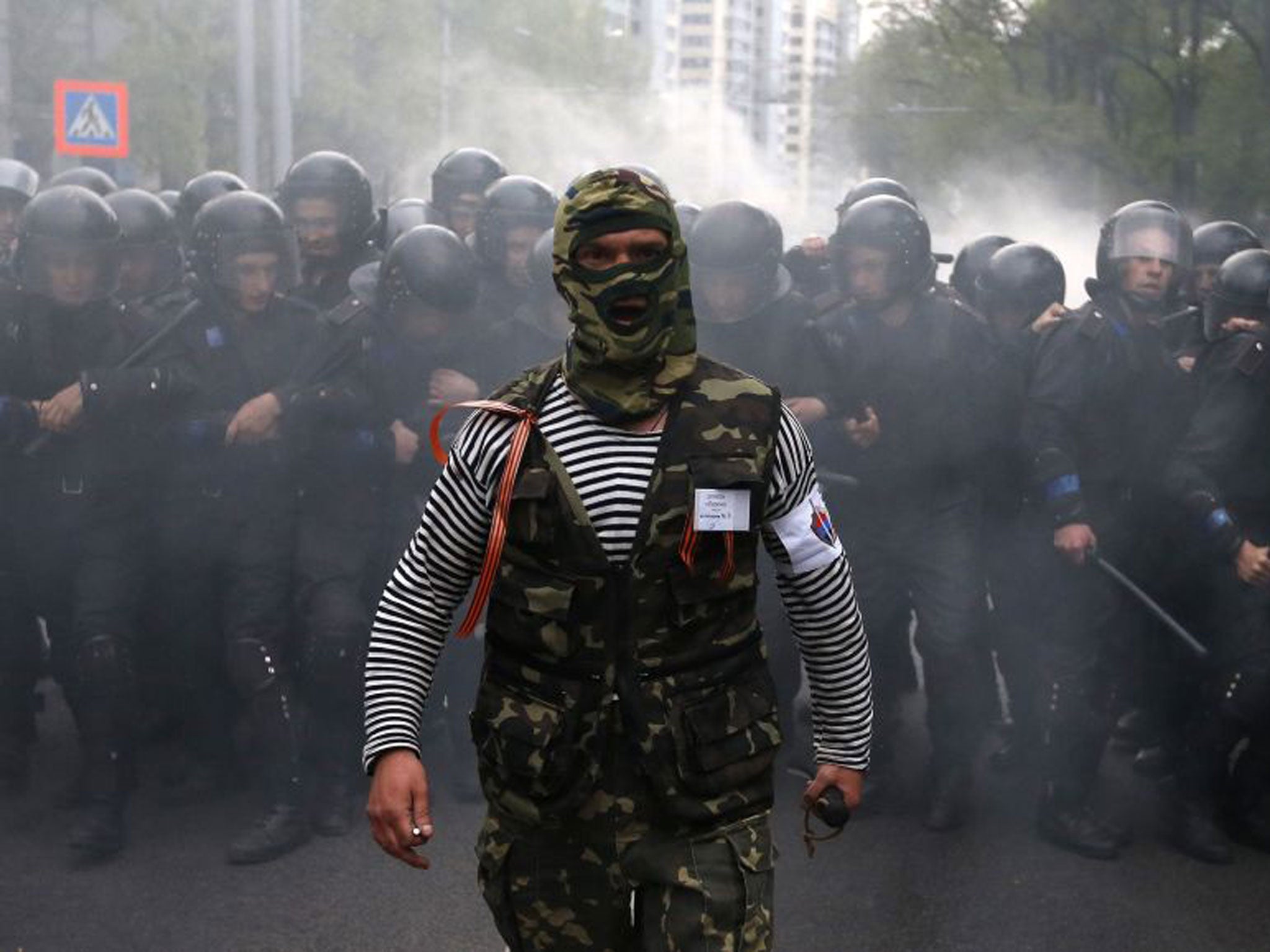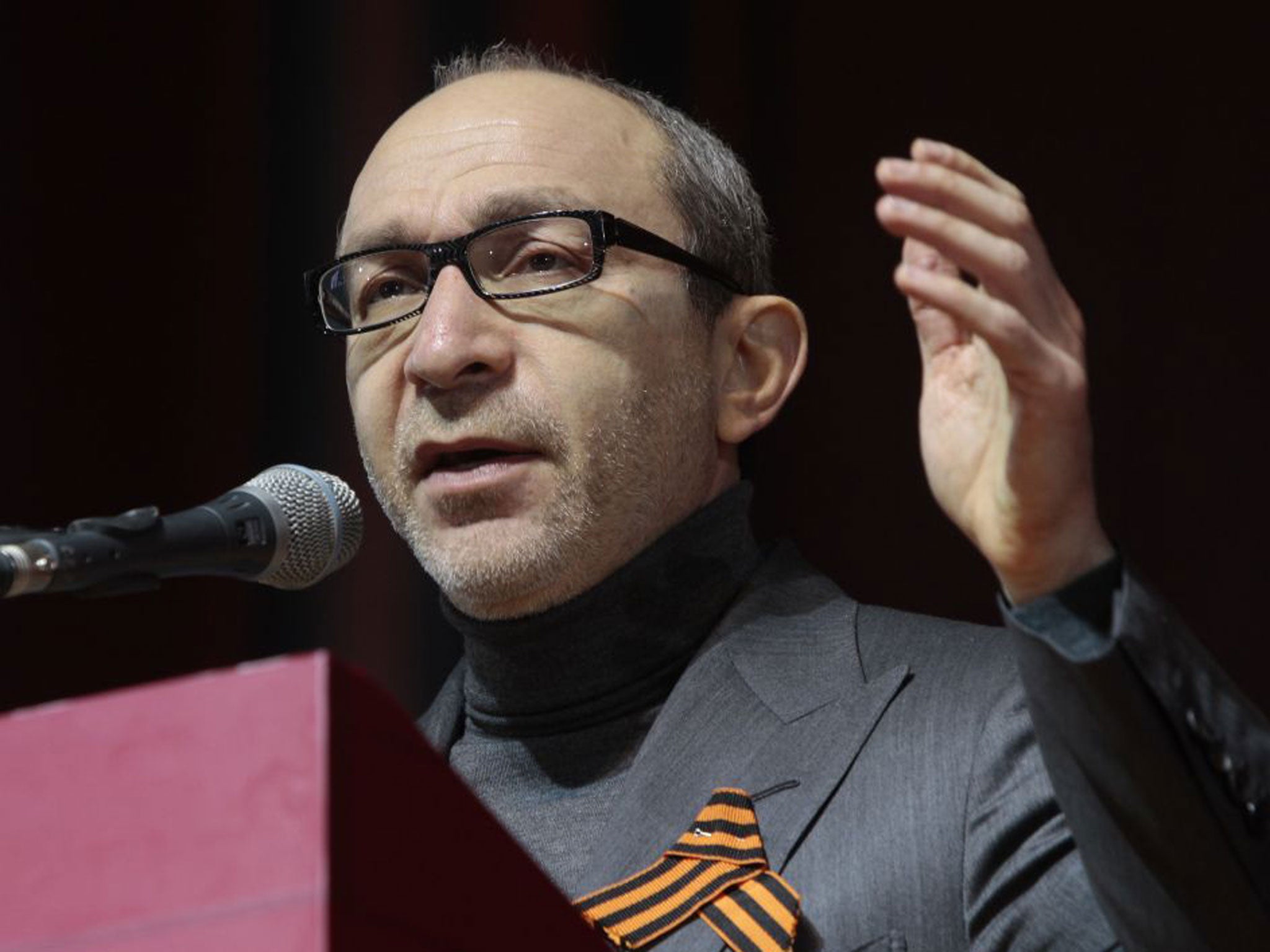Ukraine crisis: Mayor of second city Gennady Kernes fights for life after murder attempt is blamed on Kremlin
Country falls further into chaos with fears high-profile figures are now targets

The day began with the police station and administration building Konstantinovska being overrun; next the airport at Kramatorsk was attacked with rocket propelled grenades and then the mayor of Kharkiv was shot in the back. It ended in a vicious ambush on a demonstration in Donetsk. While America and the European Union impose new sanctions on Russia, violence and turmoil continues unabated in eastern Ukraine.
The attempted murder of Gennady Kernes, the mayor of the country’s second-largest city, raised fears that prominent public figures were being targeted for assassination. Last night he was “fighting for his life”, said his spokesman, after emergency surgery, with blame for the shooting leveled at both the Kremlin and extreme right wing groups.
Mr Kernes, a colourful character who regularly posted photographs of himself on social media taking part in sporting activities, was gunned down while he was out cycling, jogging, or swimming according to differing accounts of what took place. Valeriy Boyko, the director of Surgery institute in Kiev, where he was being treated, said the mayor “had suffered a very serious wound with a number of organs damaged”.

The 64-year-old billionaire businessman had been a fervent supporter of Victor Yanukovych, the overthrown president, and a fierce critic of Kiev’s Maidan, banning similar protests in Kharkiv under an emergency order which had been put in place to “avoid the spread of infectious diseases”.
Since then, however, he had sought to distance himself from Mr Yanukovych’s coterie and spoken out for a united Ukraine and those who want to take the region under Moscow’s rule. Zurab Alasania, the director general of the state-run National Television Company, charged: “The Russian Federation is identifying and liquidating key centres of resistance”. However, Sergey Borodkin, a separatist leader in Donbass who had been working with sympathisers in Kharkiv, dismissed the claim: “He was close to Yanukovych, he was against the Maidan, the fascists there hated him. We know that members of Right Sector [an ultra nationalist group] visited Kharkiv three weeks ago to plan attacks.”
Pro-Russian officials said Mr Kernes had made a public statement that he was being subjected to “political persecution”, adding that Arsen Avakov, Minister of Internal Affairs of Ukraine, could be linked to threats against Mr Kernes and the attack on him.
There is no evidence that Mr Avakov has any link to Monday’s shooting. The two men have, however, clashed in the past with Mr Avakov accusing Mr Kernes, to whom he lost the mayoral race in 2010, of organising gangs to attack Maidan protestors in Kiev.
There were other possible motives mooted for the attempt to kill him. Mr Kernes, who has convictions for theft and fraud, was allegedly linked in the past to organised crime. He is also one of the most prominent Jews in the country; there has been rise in anti-semitism recently, but the mayor’s colleagues say he had not received any threats on religious grounds.
Kharkiv has been relatively stable in recent weeks after some initial clashes between pro and anti-Russian demonstrators. The unraveling of security there would impose massive strains on the already stretched resources of the Kiev administration as it attempts to cope with the confrontation in the Donbass.
Kramatorsk airport, where the government’s anti-terrorist mission to take back a dozen protester-held towns and cities is based, came under fire by fighters using rocket propelled grenades and Kalashnikovs. Two service personnel were injured: a number of officers seen as crucial for planning future operations were immediately relocated, some back to Kiev.
This was the second attack in four days on the airport. A helicopter-gunship was destroyed in a previous one and senior officers are considering whether the location is safe enough to be such a crucial hub. The owner of the airport, Dmitri Podushkin, who had been present during both attacks, said: “The first one was like watching a film, this one was very real. They will try to keep on hitting this place and there is always the possibility that there will be casualties. Of course, we are very worried about the future. Planes can still fly from here, but the civil side of the airport has ceased to function.”
Supplies to the Ukrainian forces are, however, continuing to come in through the military side, although restrictions have been imposed on flights. On the ground, there had been an increase in the numbers of Ukrainian checkpoints which were supposed to stop the movements of militant fighters between urban centres especially from Slovyansk, a separatist stronghold.
But yesterday morning gunmen took over the police headquarters and municipal offices at Kosryantynivka, a city half way between Slovyansk and Donetsk, replacing the Ukrainian flag with those of the Peoples Republic of Donetsk and Russia.
Concrete blocks and sandbags were being put in front of the buildings by late afternoon with men wearing balaclavas and Kalashnikovs and, on two instances, Russian Saiga combat shotguns, on guard. Aleksei, one of those who took part in the takeover, said: “We did this without firing a shot, no one was hurt. The police support the people, they are getting on with their work, we are making sure we’re properly protected for when the Ukrainian army attacks.”
Juliana Anatoliyevna, 40, standing outside the municipal building, wanted to stress: “We had been waiting for this to happen. We saw other places becoming free and we were kept waiting. We have had 22 years of Ukraine and all that has given us is misery, industries shutting down and unemployment. All we want now is a referendum, as soon as possible.”
In the evening, a rally by pro-Ukrainian protesters started peacefully in Donetsk, however as a march began through the city streets, packs of youths and men, some of them football supporters emerged from the shadows with swinging chains and baseball bats. Fist-size lumps of rocks were thrown at close quarters. The dozens of riot police on duty did nothing to intervene.
Touching the blood pouring down a cut to his head, Anton Prolenenko, a 29-year-old teacher, exclaimed: “Look, this is what we have come to expect , thugs in streets, thugs in uniform.”
Join our commenting forum
Join thought-provoking conversations, follow other Independent readers and see their replies
Comments